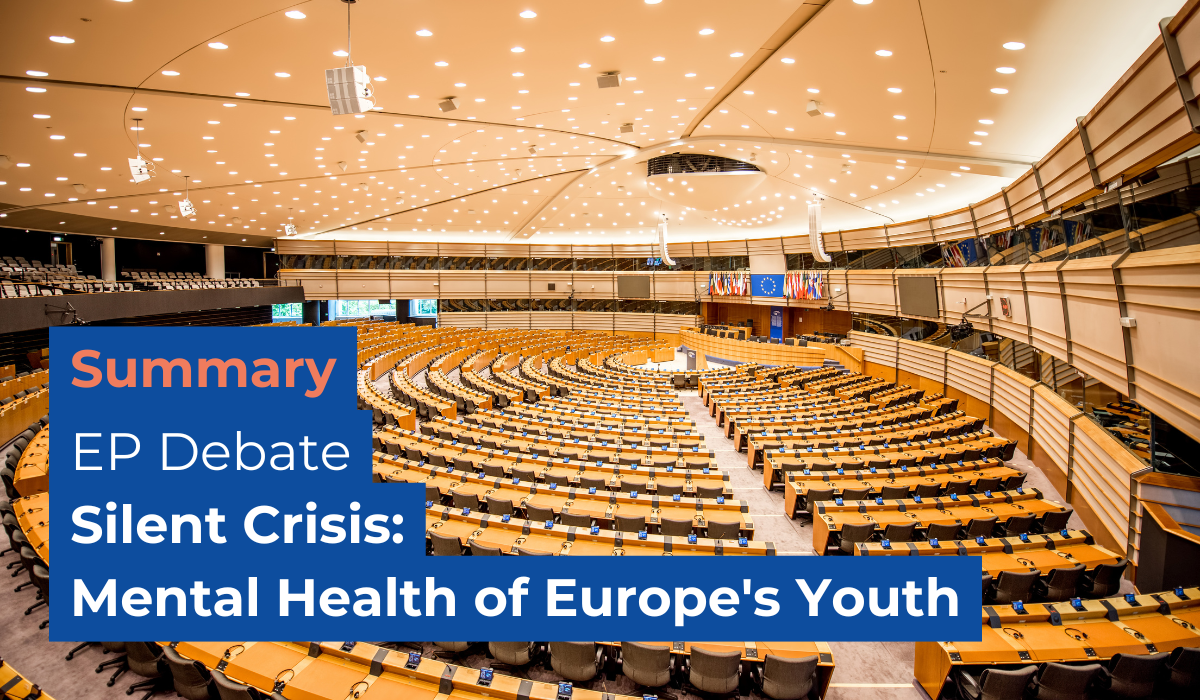Mental Health Europe summary – Silent crisis: the mental health of Europe’s youth

What is the role of the European Union in addressing youth mental health? On Wednesday the 12th of February, the European Parliament held a debate titled “Silent Crisis: The Mental Health of Europe’s Youth,” addressing the escalating mental health challenges among young Europeans.
Mental Health Europe welcomes Commissioner Micallef’s commitment to address mental health, in line with his 2024 hearing as a commissioner-designate where he noted that one of the great challenges is protecting mental health of young people and children especially online. During his statement on Wednesday, Commission Micallef highlighted the positive impacts of sports and culture around social interaction, emotional wellbeing and improved self-esteem. While he recognised that the mental health of Europe’s youth needs improving and a resolute response, Commission Micallef also stressed that the active participation and involvement of young people and all stakeholders from teachers to families, is key to the success of initiatives. The Commission aims to address mental health though the EU-wide inquiry on the broader impacts of social media and an EU Action Plan on Cyberbullying.
MEPs took the floor to highlight the urgent need for increased focus on mental health across Europe. Factors such as the COVID-19 pandemic, climate change, and digitalisation were identified as contributors to increased risk of mental health problems.
In particular Mental Health Europe was pleased to hear points by decision makers that are reflective of our long-standing calls, such as the need for mental health prevention and early intervention, the socio-economic risk factors of mental health to be addressed, increase in mental health literacy and training for professionals, digital tools to be designed to protect young people’s mental health and a European Action Plan on Mental Health.
Addressing socio-economic risk factors
Calls for urgent action to tackle the socio-economic drivers of poor mental health were echoed, including poverty, job insecurity, and insecure housing. MEPs urged increased funding for social support systems, and stronger protections for vulnerable groups to reduce inequalities.
Prevention and early intervention
Stronger mental health prevention and early intervention strategies were called for, including integrating mental health education in schools, increasing awareness campaigns, and expanding youth-friendly support services. They emphasised the need for EU-wide initiatives to ensure timely support and affordable care.
Mental health education
MEPs also recognised the need to improve mental health literacy through education, equipping young people with necessary tools. Whole-schools approach, the need for greater investment in mental health literacy and the integration of mental health support in schools were also mentioned.
Digitalisation
The importance of stricter regulation of digital platforms and social media to protect young people’s mental health was stressed. Tech companies were urged to prevent harmful content, combat cyberbullying, and ensure responsible algorithm design. Additionally, MEPs stated the need for digital literacy education, empowering youth to navigate online spaces safely.
Training for professionals
The need for increased training of mental health professionals, more specialists and stronger EU support for mental health training programs to improve accessibility and care quality were reiterated by speakers.
European Action Plan on Mental Health
MEPs also called for the European Union to be a leading actor in addressing mental health and collecting data. The debate underscored the need for a European Action Plan on Mental Health with a dedicated budget. Mental Health Europe, alongside 50+ organisations, provide further recommendations for what a comprehensive strategy should encompass in this joint statement.
While warmly welcoming the recent debate, Mental Health Europe encourages continued conversation on this critical topic. There is still a long way to go to ensure mental health is finally on par with physical health – and this requires a cross-sectoral approach. Mental Health Europe remains committed to offering support and monitoring progress towards the vision of a Europe where everyone thrives, and no one is left behind.
Stay connected
Get our latest news, personal stories, research articles, and job opportunities.

